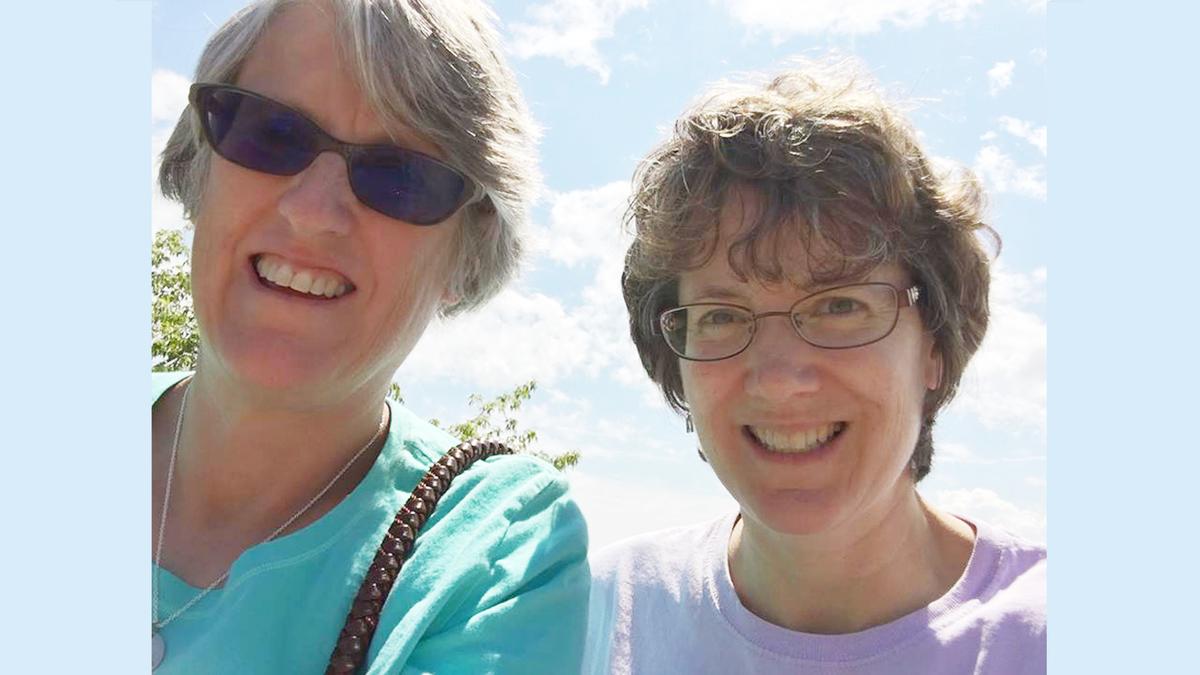PATHS CROSS
Janelle Wilson writes: When I moved to Duluth from Kalamazoo, Michigan in 1995 to begin my position as an assistant professor of sociology at UMD, I immediately became friends with Carmen Latterell. We initially met because we lived in the same four-unit apartment building. I quickly learned that Carmen also taught at UMD — she was an instructor in the Department of Mathematics & Statistics.
Carmen had earned her masters from UMD and was a gifted instructor who was hired on to teach full-time in her home department. She went on to earn her Ph.D. in mathematics education from the University of Iowa in 2000. During her Ph.D. program, she and I had conversations about some of her coursework, and, to my surprise, we discovered a shared interest and expertise in some similar areas – namely, learning theories. Upon receiving her Ph.D., Carmen returned to UMD where she is now a full professor.
COLLABORATION
Collaborative work between a mathematician and a sociologist isn’t typically expected, but Carmen and I discovered common interests that have resulted in (to date) 11 published articles, as well as a number of joint presentations.
As a math educator, Carmen is concerned with recruiting people into the field of mathematics, demonstrating to students that excelling in mathematics need not be viewed as out of their reach. She helps prepare teachers at both the elementary and secondary levels to teach math in ways that attract students’ interest and build upon their aptitudes.
My own work falls in the field of social psychology and my primary research interests include the sociology of everyday life, nostalgia, and generational identity.
Our interests overlap. Carmen and I have had conversations about how both the subject matter of math and the profession of mathematician are viewed in popular culture. In fact, this was the focus of our very first article.
VIEWS ABOUT MATH
It was inevitable, then, that we would further explore how the wider culture and socialization experiences influence individuals’ views about math. We proceeded with a research agenda aimed at better understanding how students (at elementary, middle, high school, and college levels) conceptualize math and how they self-report their comfort level and competency with math. Many of the methodologies we have employed are commonly used in the social sciences – e.g., surveys, semantic differentials, content analysis, and qualitative approaches such as collecting narrative data.
Most recently, we have been collecting individuals’ “Math Autobiographies.” A primary focus in my sociological research revolves around memory, identity, and the construction of meaning. Our collecting these math autobiographies is very much in line with these interests, and the narrative data that participants provide can tell us a great deal about the influence of previous experiences and the role of particular individuals in shaping the way they see and feel about math. In this way, what is learned through these data has clear implications for training and preparing future teachers.
We have worked diligently to make this research enjoyable as well as informative. You can tell by the titles, "Math is Like a Tornado in Kansas," "Math is Like a Lion Hunting a Sleeping Gazelle," and “Nerds? Or Nuts? Pop Culture Portrayals of Mathematicians."
It's been a great experience exploring how mathematicians are viewed in popular culture. It's also been quite a privilege to be able to work with my best friend on research that we both find fascinating and also important!
---------------------------------
PUBLISHED WORK
A list of our published works (to date) follows. This body of research has been well received and has the potential to impact the way math is perceived, taught, and learned.
Wilson, Janelle & Latterell, Carmen. (2017). "Elementary Education Majors’ Stories About Math: An Analysis of Students’ Mathematics Autobiographies,“ Issues and Ideas in Education, 5(1), pp. 1-13.
Latterell, Carmen & Wilson, Janelle. (2017). "Metaphors and Mathematical Identity: Math is Like a Tornado in Kansas." Journal of Humanistic Mathematics 7(1), pp. 46-61.
Latterell, Carmen & Wilson, Janelle. (2016). “Math is Like a Lion Hunting a Sleeping Gazelle: Preservice Elementary Teachers’ Metaphors of Mathematics.” European Journal of Science and Mathematics Education, 4(3), pp. 283-292.
Latterell, Carmen & Wilson, Janelle. (2016). “Stories about Math: An Analysis of Students’ Math Autobiographies"; International Journal of Research in Education and Science, 2(2), pp. 279-285.
Wilson, Janelle & Latterell, Carmen. (2014). “What Does the Non-Mathematics Intensive Major Think Mathematics Is?” Janelle Wilson and Carmen Latterell. MountainRise 8(2), pp. 1-10.
Latterell, Carmen & Wilson, Janelle. (2013). "What do People Think Mathematics is and Why does it Matter?"; ETC: A Review of General Semantics, 70(4), 387-394.
Latterell, Carmen & Wilson, Janelle. (2012). "Students - Perceptions of What Mathematicians Do" The Mathematics Educator 13(2), pp. 73-84.
Latterell, Carmen & Wilson, Janelle. (2004). “Popular Cultural Portrayals of Those Who Do Mathematics.” The Humanistic Mathematics Network Journal Online, 27.
Latterell, Carmen & Wilson, Janelle. (Fall 2002). “What is Mathematics?” A Transformation of Pre-service Mathematics Teachers’ Definitions.” American Association of Behavioral Sciences Journal, pp. 54-61.
Latterell, Carmen & Wilson, Janelle. (2001). “The Mathematician and the Sociologist in Dialogue: New Perspectives on the Learning of Mathematics.” Perspectives Electronic Journal of the American Association of Behavioral and Social Sciences 4.
Wilson, Janelle & Latterell, Carmen. (2001). “Nerds? Or Nuts? Pop Culture Portrayals of Mathematicians.” ETC: A Review of General Semantics 58(2), pp. 172-178.
Department of Mathematics & Statistics
Department of Anthropology, Sociology & Criminology
Above from left: Carmen Latterell and Janelle Wilson
